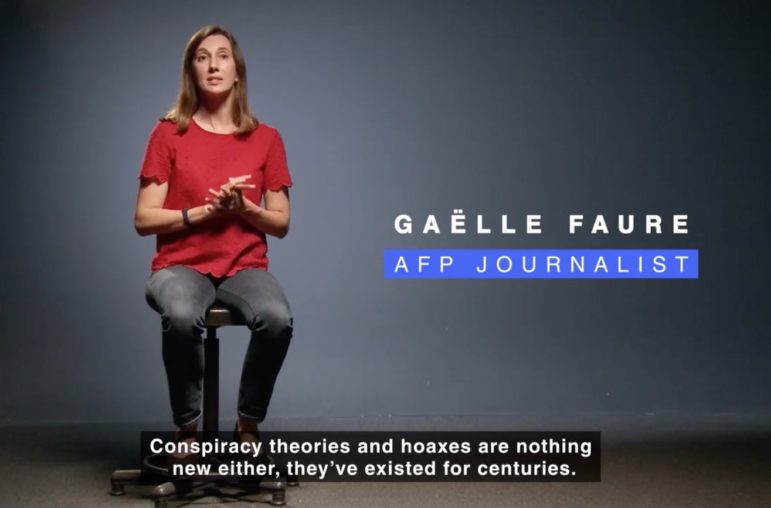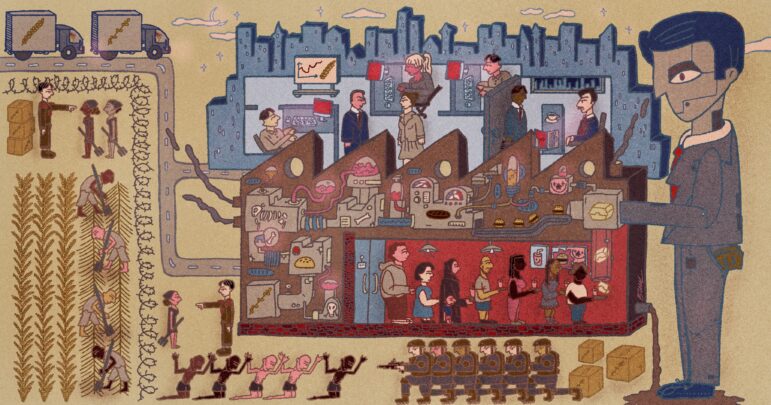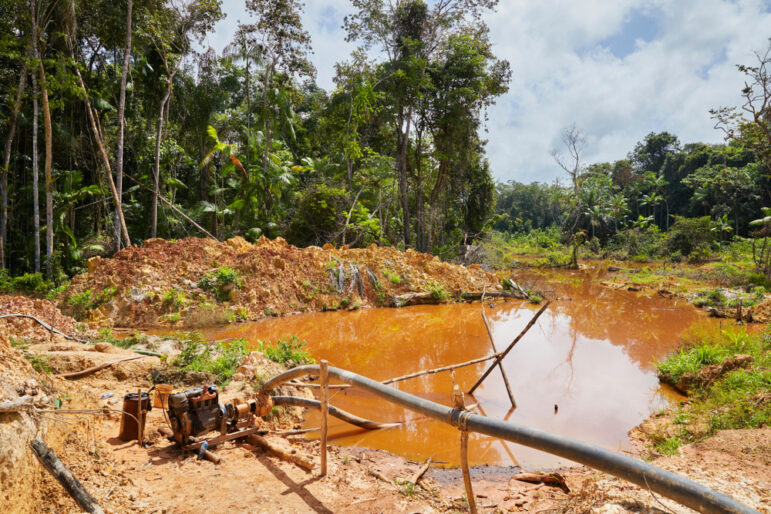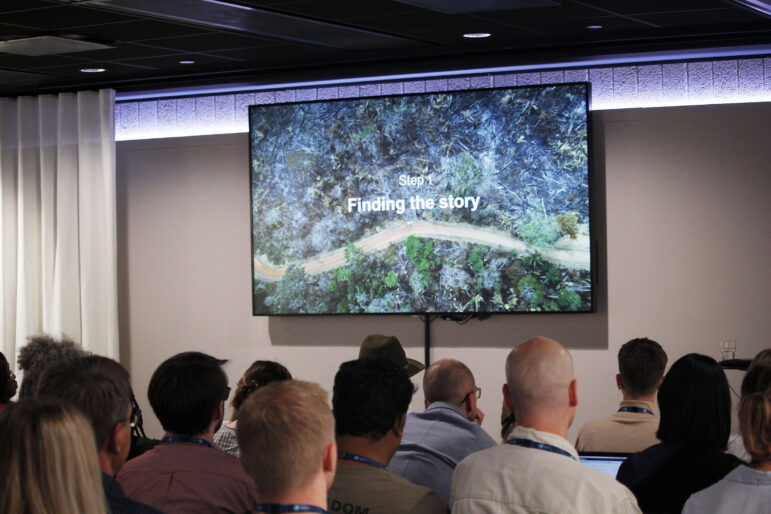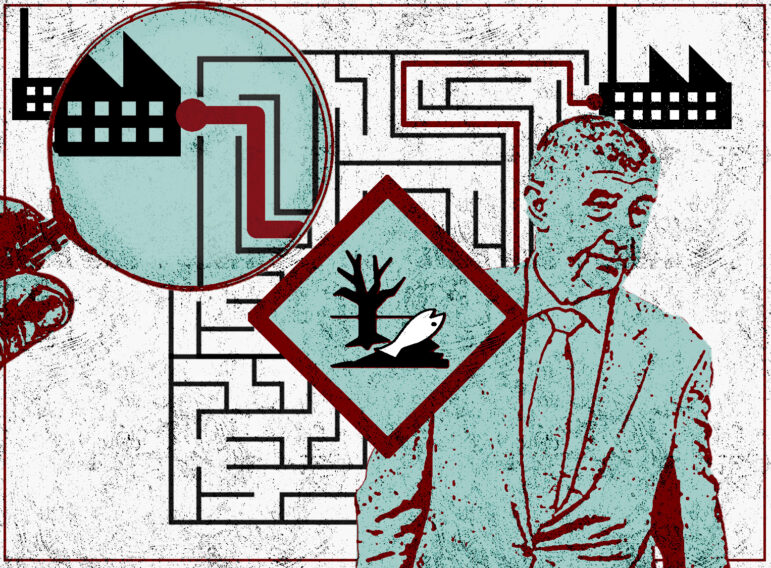

Illustration: Sanja Pantic/BIRN
Anatomy of an Ecocide: The Mysterious Poisoning of Czechia’s Becva River
On a September afternoon five years ago, along a quiet stretch of the Becva river in the foothills of the Moravian mountains, the fish started acting strange.
Stanislav Pernicky heard about it on the phone and hurried over to see for himself. The fish were everywhere, leaping from the river and thrashing about on the shore. “It was as if the water was boiling,” he said, when I tracked him down a couple of days later. “Hundreds of dead fish wherever you looked, others dying in our hands. It’s not a sight I’ll easily forget.”
Pernicky is in his seventies, an economist by background, and he has fished in the Becva for as long as he can remember. The river — its name is pronounced “baitch-va” — is a tributary of the Morava, which feeds the Danube. Pernicky is the chair of the local Fishermen’s Association, a stalwart of Czech country life that oversees all manner of fishing-related concerns, from issuing permits and organizing competitions to lobbying officialdom and flagging illegal spills and dumping. Most of the fishing here is for sport: the catch is returned, alive, to the water. This stretch of the Becva is a home for heavy industry, once powered by the nearby coalfields. Factories built under communism line the river’s banks and discharge their effluent into its waters. The anglers here have always assumed that the fish are unfit for the table.
Watching from the riverbank on September 20, 2020, Pernicky noted young fish among the dead and dying, as well as adults of reproductive age. He was surprised by the sheer diversity of species. “There were barbel, pike, chub, nase, rainbow and brown trout, perch, burbot. It was only then that we realized how rich the river was.” By evening, the scale of the die-off had become evident. All aquatic life had been wiped out along a 40-kilometer (24-mile) stretch of the river. Photos from the day showed men in waders shovelling great heaps of dead fish onto trailers. Between 80,000 to 100,000 fish were estimated to have died. The total weight of the carcasses brought ashore was some 40 tons.
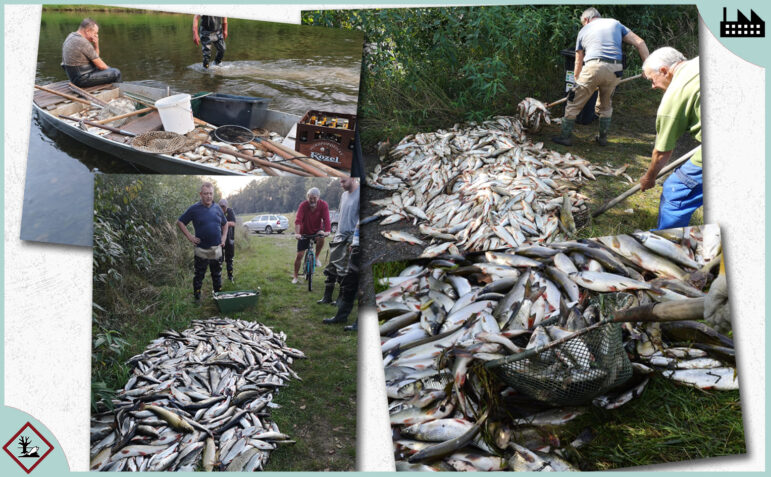
Some 40 tons of poisoned fish were brought ashore after the disaster. Images: Stanislav Pernicky; Illustration: Sanja Pantic, BIRN
The disaster made national headlines and put an uncomfortable spotlight on the prime minister at the time, the billionaire Andrej Babis. The self-styled “Czech Donald Trump” was a year away from a general election, and his ratings had just nosedived because of his chaotic COVID-19 policy. Now, social media was flooded with speculation that one of his factories had poisoned the river.
Babis’ Agrofert conglomerate is the country’s biggest employer after Skoda Auto. Its vast holdings include the Deza chemical works, a sprawling site on the banks of the Becva that handles coal tar and petroleum by-products. The spot where the fish began dying off was less than a kilometer downstream from a drain that discharged Deza’s wastewater into the river. In the days after the disaster, the firm’s spokesman became a regular fixture on the TV news, reassuring the country that the factory had nothing to do with the dead fish.
The Czechs used to be lauded as the success story of post-communist Europe, the standard bearers for free markets and liberal democracy. The Becva river poisoning illustrates what went wrong. The disaster would be investigated by journalists and by the authorities. Their diverging conclusions highlight the power of investigative journalism — and its stark limitations — within a compromised system.
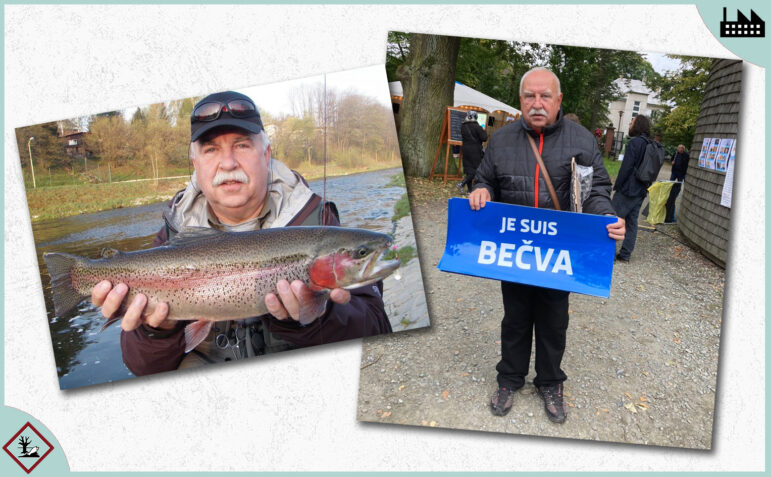
Stanislav Pernicky has fished along the Becva all his life. Photos: Stanislav Pernicky; Illustration: Sanja Pantic/BIRN
I work at Deník Referendum, an online newspaper in Brno, the largest city in the eastern Czech region of Moravia. Our newsroom is less than two hours’ drive from the site of the poisoning. The editor-in-chief, Jakub Patocka, was my co-author for a book about Babis, and we both have a background in the environmental movement. We began investigating the Becva poisoning, suspecting that there was more to it than met the eye. The breakthrough came with a tip-off from a whistleblower. Our investigation would establish that there had been an industrial accident at Deza, just hours before the fish began dying off. A toxic slew had leaked into the drains on site. We gathered whistleblower testimony and expert analysis to reveal the cause: a combination of human error and long-term neglect. Our revelations were picked up by the national press and broke the traffic records for our website.
Babis responded by threatening legal action and calling our newsroom a “cesspit of liars.” When he went on to lose the 2021 election, he would blame it partly on the Becva investigation. He seemed to have taken issue with investigative journalists generally — the international consortium behind the Pandora Papers also featured on his list. On the eve of the elections, they had revealed how the prime minister had used offshore tax havens to buy luxury property in France.
While Babis railed against the watchdog press, he had little to fear from the institutions that could really hurt him — the regulators, police, and judiciary. The two-year investigation by the authorities steered clear of his factory. Our reporting had established that there had been an industrial accident at Deza, which had led to a toxic leak — but we could not prove that the toxins had reached the river. A Deza spokesperson, responding to our story, insisted that the leak had been contained on site.
However, the institutions that could have established the truth never treated Deza as a suspect. Instead, the prosecution argued that the toxic slew had entered the river from a different factory — Energoacqua, which is not owned by Babis — further away, via a drain some three kilometers upstream from the spot where the fish began dying off. Independent experts told us the prosecution’s theory violated the laws of physics [essentially, the die-off should have begun much closer to the alleged entry point]. A parliamentary inquiry concluded that vital evidence — water samples from the river — had either been lost or were never collected on time. A video submitted as evidence by the prosecution ended up undermining its case. Its star witness was overheard on film contradicting his own testimony.
Nonetheless, the court eventually endorsed the prosecution’s version of events. The judge also blocked the possibility of appealing the verdict, by downgrading the case: it would no longer be a matter for the courts but for the environmental regulator. Babis, meanwhile, is gearing up for another general election this year. With growing discontent over the current government, our homegrown Trump stands a good chance of imitating his hero’s comeback. As usual, he is projected to win big in “rust belt” areas, such as the northern part of Moravia.
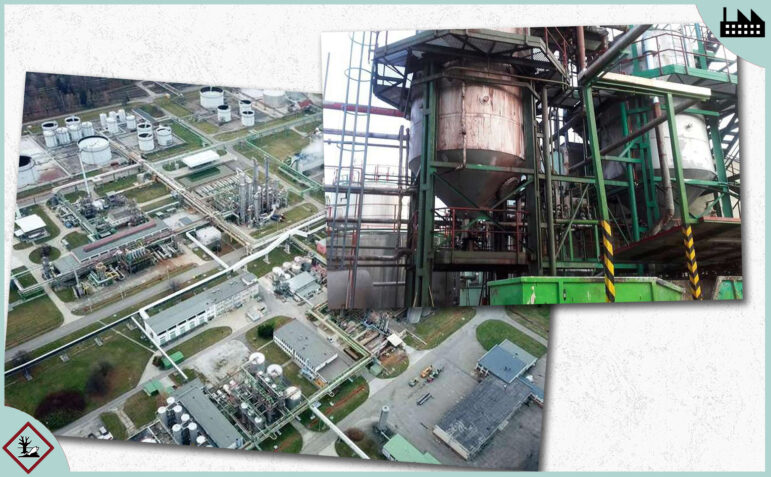
The Deza factory, owned by Andrej Babis’ Agrofert conglomerate, is sited along the banks of the Becva. Images: Denik Referendum, Deza whistleblowers; Illustration: Sanja Pantic, BIRN
Until recently, the Czechs were believed to have held out against the illiberal, authoritarian politics that have taken root in Hungary, Poland, and Slovakia. Granted, the country had problems with corruption but it was also prospering within the EU. Like their eastern neighbors, the Czechs have a new class of billionaires, typically the well-connected members of the old communist elite that had taken over the privatized assets of the ex-communist state. Many Czech billionaires have been welcomed westwards. The country’s top businessmen have acquired ammunition factories in the US, as well as a postal service and power plants in the UK. They generally enjoy a better reputation than their post-Soviet counterparts. In the Western financial press, they are likely to be described in familiar terms, as “tycoons” rather than the more exotic “oligarchs.”
The Czech billionaire class is “pretty much pluralistic” compared to its equivalent in countries like Hungary, said Jiri Pehe, a political scientist and former diplomat who now serves as director of New York University’s Prague campus. “Hungarian oligarchs are happy with one-party rule, which guarantees the benefits they enjoy. The Czech oligarchy, on the other hand, operates in a sort of competitive environment.”
In fledgling democracies, oligarchs can exert significant influence over the state — particularly its enforcement of laws and regulations. This helps to lock in their competitive advantage. In the phenomenon described as “state capture,” politics becomes a means to a commercial end, serving to help businesses cement their grip on the market. The result today is a deeply lopsided relationship between business and politics, corporation and state.
“Privatization was overseen by the weak political parties of the time,” Pehe said. “The new class of super-rich was born through this process. And this class consequently started privatizing the parties to make them serve their business needs.”
State capture is increasingly a feature of capitalist systems worldwide. It creates a permissive environment for crimes such as ecocide, and it can obstruct the path to a more sustainable future. “The oligarchs and billionaires that control politics in general are operating in an environment that they themselves helped set up,” Pehe said. “Radical changes and regulations are against their interests. In an era of climate change, state capture acts as a brake on states being able to do any innovative policy.”
[…]
Decision-making at regulatory agencies can be influenced through a handful of senior appointees. “You don’t need to control every single person in the system — just a few people in key positions,” said David Ondracka, the former director of the Czech branch of Transparency International, the Berlin-based anti-corruption watchdog. Only senior officials at the agencies need to be aware that their positions depend on the good graces of a political master. The rest of the people, he said, “are so focused on their immediate tasks, they do not consider the overarching purpose behind what they are doing.” The staff could be biased in their duties without necessarily thinking of themselves as compromised, he said. “They might do their jobs honorably enough, but they would also always respect the fact that some players were untouchable, too big to confront.”
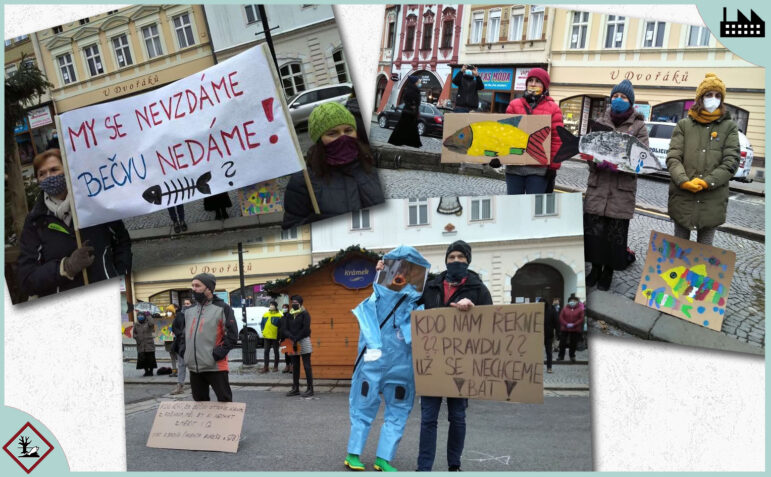
The ecocide on the Becva triggered protests in the region. Images: Zuzana Vlasata, Jakub Patocka; Illustration: Sanja Pantic, BIRN
Media outlets owned by Babis backed the theory implicating Energoacqua. Their coverage drew heavily on a leaked report from the prosecution witness, Jiri Klicpera. Environment Minister Brabec seemed to take a personal interest in the case. At one point, he tweeted that he was rushing to inspect the site himself, following reports that foam had been spotted in the river near the drain. Deza’s representatives initially stuck to the official line, insisting that nothing untoward had happened at the plant. “We have not detected any leak of hazardous substances,” spokesman Karel Hanzelka said, when we contacted him for comment in November 2020.
The evidence would suggest otherwise. A few weeks after the disaster, I had begun communicating with a source who had contacted me via encrypted email, claiming to be a worker at Deza. “I have information,” the messages said. “Do you want to meet?” The source made a sensational claim. An industrial accident had taken place at the factory early on the morning of September 20, 2020, just hours before the disaster, and it had been covered up.
Read the full behind-the-scenes account of this investigation, produced as part of the Fellowship for Journalistic Excellence, supported by the Erste Foundation in collaboration with the Balkan Investigative Reporting Network.
 Zuzana Vlasatá is an investigative reporter and the deputy editor-in-chief of the independent Czech daily Deník Referendum (https://denikreferendum.cz). Her focus is on environmental topics, oligarchs, corporate power, and state capture. She is also a vice chairwoman of the Czech Committee of the International Press Institute.
Zuzana Vlasatá is an investigative reporter and the deputy editor-in-chief of the independent Czech daily Deník Referendum (https://denikreferendum.cz). Her focus is on environmental topics, oligarchs, corporate power, and state capture. She is also a vice chairwoman of the Czech Committee of the International Press Institute.

